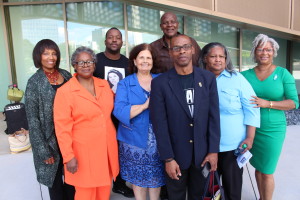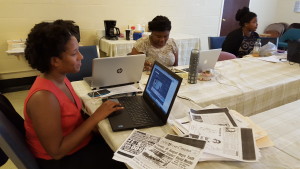
The second week of work for the summer interns of the Cold Case Justice Initiative (CCJI) entailed more investigation into our cases. We made public records requests to certain Police Departments and made visits to various local libraries. In between research sessions, we conducted a good deal of community outreach. At the People’s Agenda afternoon meeting on Tuesday, June 9, three interns, Shirlise, Andrew, and I, Professor McDonald, and various local activists crammed into the second story of the SCLC Women’s Building on Auburn Avenue. Joe Beasley of Rainbow Push brought visitors from Partners for Care, an American-based non-profit focused on developing local capacity and resources in Kenya. One of the head American administrators of the program explained that 85% of the world’s disease is due to waterborne illness. Therefore, the fight for clean water, basic as it sounds, is paramount to world health. Partners for Care provides light weight, sanitary, and reusable water packs for $10. You can find the link to donate here https://www.partnersforcare.org/what-we-do/outreach-programs/.
Following Mr. Beasley’s introduction, Pastor John Hirbo spoke from a Kenyan perspective about the struggles arising from poverty and the work that Partners for Care is doing to cultivate local leaders and healing in his community. Explaining the local poverty that motivates him to work tirelessly washing children’s feet and providing clean water, the pastor stated, “One goal: a better Africa. Unite. Somewhere somebody is doing evil, and we followed… Someone here [in America] can see far… Come for us, we are ready to accept it.” With passion, the pastor extolled the virtues of faith, exclaiming, “God will give my children a good life.” The riveting presentation ended with a rousing rendition of Amazing Grace sung by a Kenyan gospel singer traveling with the Partners for Care team. The CCJI interns left with a stronger sense of the interconnection of global poverty issues and the state of American society. We were impressed with our own relative blessings and the complacency of many Americans, thus instilling us with a stronger commitment to fight for social justice against the evil that surrounds us.
After the People’s Agenda meeting, Professor McDonald led Shirlise, Andrew, and me to lunch at Mary Mac’s with Hank Stewart and our own Kevin Moran. Mr. Stewart is a renowned poet and founder/ operator of a youth leadership development foundation based in Atlanta. He actively supported a voter registration drive to register every graduating high school senior in three Atlanta high schools this year. Over a traditional southern feast of fried chicken, chicken livers, collard greens, shrimp and grits, mac n’ cheese, and broccoli casserole, washed down with sweet tea and water, we strategized about how best to reach young people and to convince them to talk to older family members about their personal experiences during the civil rights era, including suspicious activities that they either experienced, witnessed, or were aware of. Mr. Stewart being a stalwart cultural producer himself, we also discussed a multimedia campaign incorporating hip-hop with the CCJI’s political message.
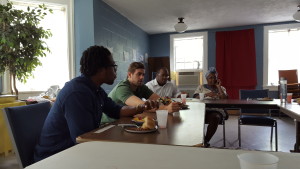
On Wednesday afternoon, we ate lunch with Inez Giles. Ms. Giles is a wise woman, a long-time member of the Oakhurst Presbyterian congregation and resident of DeKalb County. She had cooked a delicious spread of baked chicken, ham, beans, potato salad, mac n’ cheese, and pound cake. We feasted. Alphonse demolished three plates in about ten seconds. After eating, we listened to Ms. Giles talk about her time in Decatur and her experience as part of the black community. She cautioned us interns to think carefully about the way we approach members of the community with our work. Ms. Giles suggested, “Just ask people, how can we help?” Her message was clear: we are approaching people about a sensitive topic, racial killings that have never been fully resolved. Society has until now forgotten about these folks. As law students, we must remain cognizant of the fact that many of the community members have experienced traumas that they may not feel comfortable sharing with us. We must approach these interactions openly and with sensitivity. Only by taking honest account of who we are as individuals and placing ourselves in positions where we gradually earn the trust of people will we be able to effectively serve the community.
After Ms. Giles left, Kevin Moran, Alphonse, Andrew, and I met at a local reverend’s church to ask him and his co-pastor particular questions about our respective cases. Relieved by the Reverend’s cool air-conditioned office, we listened as he started the meeting by explaining to us that we were “archaeologists of justice,” meticulously unearthing nuggets of truth, just as real archaeologists use little spoons to dig out artifacts. The Reverend then explained that he had been arrested in the ‘60s as a teenager as “[p]art of a systemic effort to have us listed with the criminal justice system. I was arrested for vagrancy with schoolbooks in my hand.” No charges were ultimately brought, but the Reverend explained a record of arrest was left that worked to track him for the rest of his adult life. Because of that early arrest, the police always had a record of him. The story helped put into perspective the experience of being a young black male in the 1960s.
Once the co-pastor arrived, we asked the reverends about our cases. They gave us helpful information. After they explained what the general opinion had been following the police killings, we asked if people had entertained the idea that something else had happened, something contrary to the police narrative. The co-pastor said, “Generally we didn’t think about what might have happened. If it did happen [that the police had killed the black youth without cause], we just had to let it go. Because there was nothing else we could do.” The reverend spoke up, “[We had] no recourse. [This was the] time of the Night Riders. [They were] not looking for justice for us. The police wanted to control [us].”
Both men agreed that black officers were often even harsher on the black youth than white cops in order to prove that they deserved their positions. “They had power,” said the co-pastor, “they had beats. They had power in the community.” The Reverend added, “They couldn’t stop whites.” The co-pastor elaborated, “they had to call a white officer.” The co-pastor concluded with the recollection, “[We] grew up afraid of the police… [Our] parents would say, I’ll call the police on you to get you to straighten up.” We left the office chilled by the reverends’ revelations.
On Thursday, we were invited to visit the Davis Bozeman firm. Located in Decatur near Candler Road, the Davis Bozeman firm handles criminal defense and civil rights litigation cases. As a community-oriented, Black law firm, Davis Bozeman displays a memorial to Black lawyers and legal advocates in the office foyer, with photographs of such leaders as Ida B. Wells, Donald Lee Hollowell, C.B. King, and Nelson Mandela.
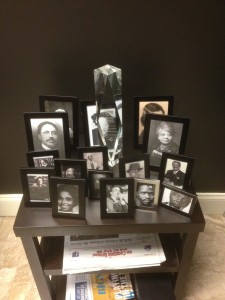
Mr. Davis expounded upon the importance of versing yourself in the legal legacy that precedes you, so that you might better add to it in your own time. Though he currently has sixty-seven criminal defense cases, Mr. Davis also took the time to explain to us his civil rights practice and how he handles criminal defense. Briefly, he covered the categories of cases the firm takes: excessive force, false imprisonment, and false arrest. Excessive force refers to the use of force by police that is beyond what is necessary to effectuate arrest, like when there is a chase, then the chief of police bashes the runner upside his head with a pistol. In the state of Georgia, false arrest refers to a warrant based on false information, while false imprisonment refers to a warrantless arrest. Mr. Davis explained that all of these types of cases are “happening, it’s always been happening. Now, we have video footage.” Even with footage available, Mr. Davis made clear that these cases amount to “the Officer’s word versus your client’s word.” Mr. Davis pledged the full support of the firm for the work done by the CCJI.
In the morning of Friday, June 12, the CCJI team stationed in Atlanta met with a DeKalb county criminal defense attorney. A local public defender, he gave us some insight into investigative methods and the contours of the criminal justice system today. First, he explained to us the best ways to obtain records of police officers in the 1960s from local Georgia agencies. Always “research,” not “investigating,” he said, in reference to how we represent our activities over the phone. Then, he told us that the best way to determine if a particular autopsy had been incorrectly performed was probably not to find the person who did the autopsy and then reveal that they were lazy and racist. Rather, a constructively parallel method would be more effective, that of determining how other coroners were doing things that weren’t lazy and racist and establishing standards independently of the target coroner. The lesson here was that people are much more willing to talk to establish contemporary standards and protocols than to incriminate themselves. Third, the attorney advised us to find community members that were there at the time. “People love talking about their communities,” he explained, so this should be an easy source of information. Given the age of the population we are dealing with, just be ready for some long-winded, unrelated stories, too, he said with a laugh.
The attorney also divulged the racism inherent to the criminal justice system today. “It’s difficult to find overt racists,” he said. “It’s easy to find people who buy into the racist system. The Justice System is racist.” The attorney took time to explain racism through the process of bonding out of jail. “Bond is never reduced by prosecutors,” he stated. In $700 bond scenarios for a simple assault charge, a White person might be able to pay it and get out versus spending six months in jail. However, for the same simple assault charge, a Black person may not be able to pay $700, and thus is forced to sit in jail for six months. Overwhelmingly, the racial contours of bonding fall along black or brown and white lines. The same pattern can be seen in pre-trial diversion programs arranged by lawyer versus plea deals taken to get out of jail without the help of representation, he revealed. “[The situation] requires brave thinking, and innovative thinking,” the attorney said. “Racism still exists in the justice system every day… [and] on the day to day, [it’s] not attributable to bad actors.” When we asked why the system couldn’t simply be altered to correct the racism inherent to the institution, the attorney responded, “It takes real effort to get at the root of it. It would mess up a lot of people’s day to day.”
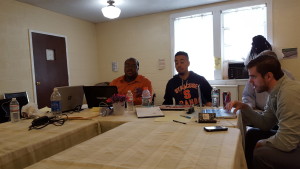
With so many different messages coming at us, our second full week of work provided the student interns of CCJI in Atlanta with a profound look at the sheer complexity of the project we are engaged in. Learning some of the history of race relations in the 1960s from first-hand sources who actually lived it humbled us and provided us with perspective.
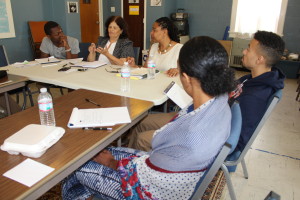
This newfound historical perspective, coupled with our own legal research, provided a firm foundation from which we were able to compare and contrast cases from the present. There has been some change, it would seem, technologically and culturally, but the core issues are still present: racism, ever present and pervasive, saturates many of the legal and civic institutions that surround and situate us.
The community has not healed from the wrongs of the past, and the wounds of the present are digging ever deeper. For us, the student interns of CCJI, grappling with the present means looking back to the past for explanation. Justice must first be achieved for what preceded us before we can adequately prepare ourselves for justice in the present. And behind the echoes of the past, we can hear the cries of living injustices committed half a world away. As the local public defender advised us, we must think bravely, we must think innovatively, otherwise the deep wounds of the past may fester, and new injuries will continue to mount…
